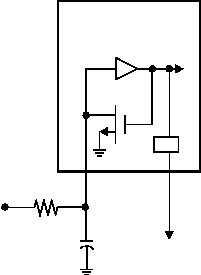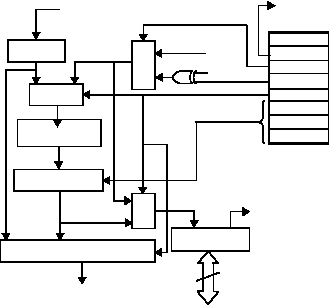© 1999 Scenix Semiconductor, Inc. All rights reserved.
- 21 -
www.scenix.com
SX18AC / SX20AC / SX28AC
to the fact that the SX device requires trimmimg to obtain
4 MHz operation. The parts shipped out of the factory are
not trimmed. The device relies on the programming tool
provided by the third party vendors to support trimmimg.
10.0
REAL TIME CLOCK
(RTCC)/WATCHDOG TIMER
The device contains an 8-bit Real Time Clock/Counter
(RTCC) and an 8-bit Watchdog Timer (WDT). An 8-bit
programmable prescaler extends the RTCC to 16 bits. If
the prescaler is not used for the RTCC, it can serve as a
postscaler for the Watchdog Timer. Figure 10-1 shows
the RTCC and WDT block diagram.
10.1
RTCC
RTCC is an 8-bit real-time timer that is incremented once
each instruction cycle or from a transition on the RTCC
pin. The on-board prescaler can be used to extend the
RTCC counter to 16 bits.
The RTCC counter can be clocked by the internal instruc-
tion cycle clock or by an external clock source presented
at the RTCC pin.
To select the internal clock source, bit 5 of the OPTION
register should be cleared. In this mode, RTCC is incre-
mented at each instruction cycle unless the prescaler is
selected to increment the counter.
To select the external clock source, bit 5 of the OPTION
register must be set. In this mode, the RTCC counter is
incremented with each valid signal transition at the RTTC
pin. By using bit 4 of the OPTION register, the transition
can be programmed to be either a falling edge or rising
edge. Setting the control bit selects the falling edge to
increment the counter. Clearing the bit selects the rising
edge.
The RTCC generates an interrupt as a result of an RTCC
rollover from 0FF to 000. There is no interrupt pending bit
to indicate the overflow occurrence. The RTCC register
must be sampled by the program to determine any over-
flow occurrence.
10.2
Watchdog Timer
The watchdog logic consists of a Watchdog Timer which
shares the same 8-bit programmable prescaler with the
RTCC. The prescaler actually serves as a postscaler if
used in conjunction with the WDT, in contrast to its use
as a prescaler with the RTCC.
10.3
The Prescaler
The 8-bit prescaler may be assigned to either the RTCC
or the WDT through the PSA bit (bit 3 of the OPTION reg-
ister). Setting the PSA bit assigns the prescaler to the
WDT. If assigned to the WDT, the WDT clocks the pres-
caler and the prescaler divide rate is selected by the
PS0, PS1, and PS2 bits located in the OPTION register.
Clearing the PSA bit assigns the prescaler to the RTCC.
Once assigned to the RTCC, the prescaler clocks the
RTCC and the divide rate is selected by the PS0, PS1,
and PS2 bits in the OPTION register. The prescaler is not
mapped into the data memory, so run-time access is not
possible.
The prescaler cannot be assigned to both the RTCC and
WDT simultaneously.
Figure 9-3. RC Oscillator Mode
Vdd
R
C
Internal
Circuitry
OSC2
OSC1
N
¸ 4
~
SX Device
Figure 10-1. RTCC and WDT Block Diagram
WDTE (from FUSE Word)
RTCC pin
MUX
8-Bit Prescaler
MUX (8 to 1)
8-Bits
WDT Time-out
Data Bus
WDT
MUX
M
RTCC
M
U
X
FOSC
RST
RTE_ES
PSA
PS2
PS1
PS0
OPTION
Register
RTCC Rollover
Interrupt
RTE_IE
RTW
RTCC
Interrupt
Enable
U
X

